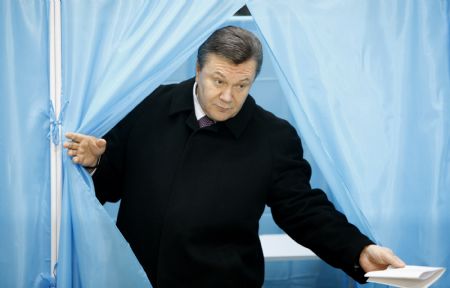
Ukrainian Election: Yanukovych Beats Tymoshenko in First Round
Publication: Eurasia Daily Monitor Volume: 7 Issue: 13
By:

On January 17, the first round of the Ukrainian presidential election brought no surprises. As predicted by the pollsters, the opposition leader Viktor Yanukovych beat Prime Minister Yulia Tymoshenko and the two will face each other in the runoff scheduled for February 7. The Liberal Serhy Tyhypko came in third and the former parliamentary speaker Arseniy Yatsenyuk fourth. The two will be courted by Yanukovych and Tymoshenko, competing over their supporters in the runoff. Incumbent Viktor Yushchenko suffered a humiliating defeat, but he will be regarded as the president under whom Ukraine witnessed its first free and fair presidential election –a far cry from the highly controversial election won by Yushchenko in 2004. Ironically, Yushchenko came to power on a wave of popular protests against attempts to rig that election in favor of the frontrunner in the current election, Yanukovych.
Yanukovych secured 35.3 percent of the vote ahead of Tymoshenko’s 25 percent. The former central bank chairman and head of Yanukovych’s election headquarters in 2004, Tyhypko scored 13 percent, trailed by Yatsenyuk with 7 percent and Yushchenko on 5.5 percent. The figures reported by the Central Electoral Commission (TsVK) are very close to those from five independent exit polls (Channel 5, January 17). Tymoshenko’s team claimed that only the results of one additional exit poll were accurate, which showed a 4 percent gap between Yanukovych and Tymoshenko. Tymoshenko’s right-hand man Oleksandr Turchynov alleged that Yanukovych’s Party of Regions, whose sympathizers dominate the TsVK, rigged the vote taking 3 percent from Tymoshenko’s real result and adding 3 percent to Yanukovych (UNIAN, January 18). However, Turchynov said that his party will not dispute the first round results in court.
Turchynov’s statement reflected the Tymoshenko team’s disappointment with her result, as she had reportedly hoped the gap with Yanukovych would be narrower than the psychological barrier of 10 percent. As the gap is slightly wider, it may be hard for Tymoshenko to beat Yanukovych in the runoff. Apart for Tymoshenko, all the other candidates accepted the official results and the exit polls. International observers, both from Russia and the West, also recognized that the election was free and fair, despite minor controversies which did not influence the final outcome. Another positive feature of the election was that Ukrainians rejected radical ideologies. The Communist Party leader Petro Symonenko scored only 3.5 percent, the far-right leader Oleh Tyahnybok 1.4 percent and Uzhgorod Mayor Serhy Ratushnyak, who expressed anti-Semitic views during his campaign, received only 0.1 percent.
Despite Yanukovych’s seemingly comfortable victory, the final outcome remains difficult to predict as experts expect that more than half the supporters of second-tier candidates may vote for Tymoshenko in the runoff. Also, neither Tyhypko nor Yatsenyuk will make life easier for the frontrunners, as both said they would not back either Yanukovych or Tymoshenko in the runoff (Ukraina TV, January 17). This is despite the fact that both Yanukovych and Tymoshenko hinting that second-tier candidates may expect rewards up to the post of prime minister in exchange for their support. Delo daily reported on January 19, citing its sources from Tymoshenko’s team, that Tymoshenko was ready to offer Tyhypko and his people the post of prime minister and up to 50 percent of ministerial positions. Whether this is true or not, the stakes are very high as the final outcome may depend entirely on the behavior of Tyhypko’s electorate.
It is easy to forecast that most of Yatsenyuk’s and Yushchenko’s “Orange” voters will back Tymoshenko in the runoff and that Symonenko’s “red” electorate will side with Yanukovych. Tyhypko’s electorate is harder to gauge. The first round results and opinion polls showed that his voters are mostly educated urban dwellers from Yanukovych’s traditional strongholds in the south and east of Ukraine. This could mean that many of Tyhypko’s voters are former Yanukovych’s voters. However, their apparent disillusionment with Yanukovych does not necessarily imply that their choice in the runoff will be Tymoshenko, who is preferred in the predominantly rural areas in western and central Ukraine where Tyhypko’s performance was mediocre. Another option for such voters will be to tick the “against both” box in the ballot papers, and pre-election opinions polls showed that as many as 20 percent of Ukrainians may choose this protest option in the runoff (Interfax-Ukraine, December 28, 29).
If Yanukovych wins the runoff, a snap parliamentary election is likely to coincide with regular local elections in late May. Yanukovych is keen to oust Tymoshenko from the government, as he admitted after the first round (Inter TV, January 17). Unlike before the constitutional reform of 2004-2006, parliament (and not the president) will nominate the prime minister. Tymoshenko’s opponents in the current parliament are in a minority, so Yanukovych will have to campaign for disbanding parliament if he wants to remove Tymoshenko from the government. If Tymoshenko wins the runoff, Ukraine’s transition to its next government should be smoother and take less time, as she does not need to disband parliament to ensure that the government is dominated by her supporters. She will only need to consolidate her existing coalition in parliament.




